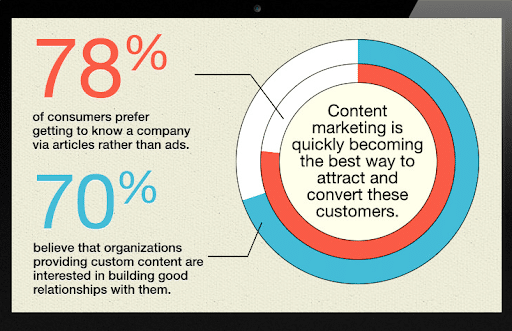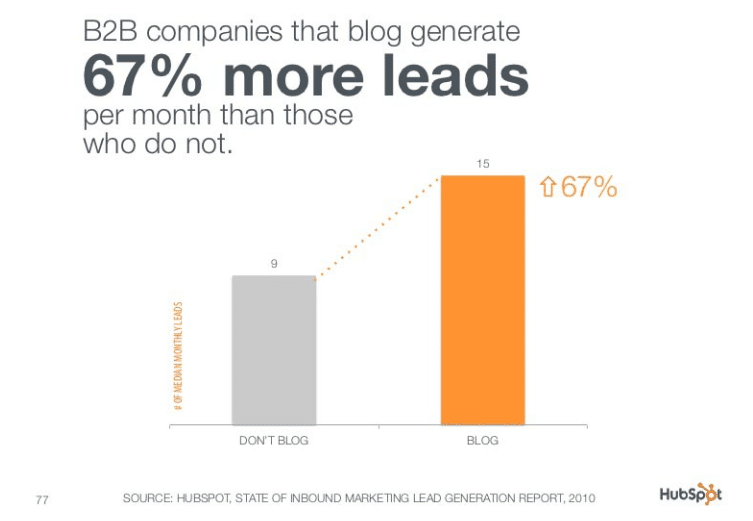Content marketing costs 62% less than outbound marketing and generates three times the amount of leads.

Source: Lyfe
And one of the best tools in your content marketing armory are blog posts.
Blogging is an essential part of driving conversions in your B2B marketing funnel as the right kind of content can strike a chord with your target audience and effectively cultivate customer loyalty.
That’s because well-researched blogs have the potential to drive strong emotional connections with target customers. The more authentic the brand, the stronger its brand recall and loyalty.
91 percent of consumers say they recommend the brands they trust to their friends and family.
But before you dive into blogging, it’s important to find blog topics that can drive organic traffic.
How do I Find Blog Topics?

Source: Slideshare
1. Spend Time Getting to Know Your Customer
What’s the point of writing in-depth blog posts if no one’s searching for the them?
If blogs aren’t attracting marketing qualified leads, then tracking metrics such as increased page views and engagement won’t do much to enhance your bottom line.
One of the ways you can cut through all the noise is to home in on your target consumer and understand their problems.
Here are a few factors you should take into account:
- Biographical information: What’s your consumer’s age, gender, income level, and profession?
- Life Aspirations: What do they want to achieve in the medium term?
- Problems: What keeps them up at night and how can you help?
- Content: What are their go-to sources of information?
Before you get started, however, dive a little deeper into business buyer personas. You could also take advantage of customer avatar worksheets.
Once this process has been ideated, it’ll make your task much easier. Your content will be able to appeal to them at a visceral level by leveraging the right keywords, messaging, topics, and conversion offers.
It’ll also help to differentiate between demand generation vs lead generation.
2. Get Ideas from Customer Questions and Feedback
When your customers submit a question or comment on your product/service that means they’re confused and need more information.
This probably indicates they’re not alone and there are other customers – both existing and potential – that have the same queries.
It’s highly likely that their first go-to medium is a search engine itself — submitting questions via a feedback form is clunky and time-consuming. This represents an opportunity for you to highlight what the most common questions are and tackle them via a blog post.
With this method, not only are you optimizing for SEO but you’re also establishing yourself as an expert in your niche.
What’s better than that?
3. Leverage Quora
Quora is an immensely popular Q&A site that attracts more than 300 million monthly visitors.
You’ll find questions on almost any topic under the sun — with some answers having hundreds of thousands of views.
So how do you use Quora for blog topics? Well, let’s say you operate in the social media marketing niche.
Simply navigating to Quora’s search bar will give you a ton of topic ideas. You can use these suggestions to further break it down or to make a pillar page.

You can also answer the question on Quora and link back to an existing blog on your site, thereby taking advantage of the platform’s organic visitors.
Furthermore, Quora’s content license allows you to republish whatever content you like as long as you link back to the original source. You don’t need to send an explicit request for it.
4. Keyword Research
Before diving in to writing your next blog, whitepaper, or case study shouldn’t you correlate your assumptions with actual, empirical data?
As we stated earlier, there’s little point writing on topics that have little to no search volume. When you spend time and resources crafting content, you want people to discover that content.
The internet is a vast place and encompasses over 1.6 billion websites. That means your consumer is being pulled in every direction — if you’re not going to actively target their specific needs you might just fade into obscurity.

That’s why keyword research is so important. Plainly speaking, it refers to the process of ascertaining search volume around specific queries. Tools like Ahrefs and Keywords Everywhere are useful third-party tools that can give you granular information on search trends, quantity, projected cost per click, and more.
How do you get started? Well you’ll need to sign up for one of these tools and then input your assumptions into its engine. They’ll scrape the web on your behalf and reveal the data.
Another excellent resource is Answer the Public. Simply enter your main keyword and it’ll give you a comprehensive list of related search queries. These can be further leveraged into ideas for new content — it’s powerful because the results are actually what people are searching for. This means you can drive a ton of organic traffic to your site without the guesswork.
Let’s say you run a home and lifestyle blog and want to do a series of posts on Halloween costumes. Plugging this keyword into Answer the Public gives the following results:

There you have it – a massive free list of topic ideas, guaranteed to drive traffic.
Conclusion
Blogging is a great method of driving organic traffic over time. While this strategy does take a little time before you start seeing results, consistency is definitely key. The best path to great results and consistency is to take an organised and professional approach to planning your content.
As long as you take a long-term view, you won’t be disappointed.




